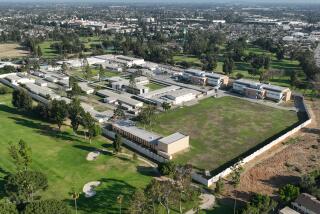Help in Learning and Life : Education: At the year-old Olmos Center in Santa Monica, former drug addict Henry Acedo teaches computer skills and steers teen-agers away from the mistakes he made.
- Share via
Only hours after her graduation ceremony at Santa Monica High School, Jessica Ruiz pitted her typing skills against a computer program designed to improve them. Taking care not to break or chip one of her perfectly painted long, red nails, Ruiz gingerly typed one letter, then another.
After about 30 minutes of practice, she left for her celebration party.
What would make a 17-year-old fully dressed for her big graduation bash take time out to practice her computer skills?
Henry Acedo.
“I told him I’d come” to class, she said, barely taking her eyes off the computer screen.
Acedo, 45, is officially a counselor mentor at the Santa Monica Non Profit Network Edward James Olmos Training and Information Center, named in honor of the actor. But to the young adults who attend his Thursday night sessions of teen talk and computer training, he is simply considered a friend.
Like Ruiz, many of the teen-agers in the sessions have spent some time at a continuation high school for students in danger of dropping out. Others are from the neighborhood. One teen-age participant was trying to buy liquor with food stamps at a nearby store when the clerk referred her to Acedo for help.
All were drawn to the narrow storefront center at 2208 Lincoln Blvd. by Acedo, a recovering drug addict.
The center was opened a year ago by Francisco Juarez, a facility supervisor for General Telephone and Electric, who wanted to provide disadvantaged youth with access to new communications technologies. Juarez, who hired Acedo, started by teaching computer skills to adults and children.
But Acedo said the courses were “too boring” and were not attracting teen-agers, so he proposed separate computer classes for youths, each to be hosted by a successful role model.
Though the center’s funding ran out last month, Acedo has helped keep his teen computer program afloat by soliciting donations from local businesses and digging into his own pockets. In his spare time, he works as a carpenter.
“He’s the one who gets a lot of kids coming here,” Ruiz said. “We can relate to him. We can talk to him differently.”
The teens say knowing about Acedo’s troubled life makes it easy to share their problems.
Acedo’s tale spans nearly 30 years of substance abuse, starting when he began sniffing glue as a 9-year-old in East Los Angeles. As an adult, Acedo said, he abused alcohol, marijuana, heroin, cocaine, speed and downers.
“I just turned into a garbage can,” said Acedo, who has been drug-free for six years. “I took anything. I wasn’t choosy.”
Acedo estimates he spent about 20 years behind bars for violent crimes, including murder. Both of his daughters were born, to separate mothers, while he was in prison. He hasn’t seen one, Angel, since she was 4.
Sickened by her father’s drug use, his other daughter, Sabrina, left home when she was 17 and did not tell him about the births of his two grandchildren for seven years. Acedo and Sabrina, now 25, were reunited last month after she learned of his rehabilitation.
Though sensitive to the problems facing troubled teen-agers, Acedo won’t put up with any slackers at the center.
When 16-year-old Devonne Pratt, Ruiz’s friend, begged off doing computer work, Acedo called her outside and told her that the center wasn’t a hangout. She could participate or leave. Earlier, Acedo had explained to another uninitiated teen-ager brought by a friend that she wasn’t allowed to smoke in the center.
“I’ll explain it to them three times,” he said. “After that, I suggest that they not come for a couple of weeks.”
In the first teen session last month, two volunteers coached about 10 students in typing skills. The students worked at a row of donated computers on mismatched desks purchased at secondhand furniture stores. Those desks will soon be replaced with new ones Acedo built from lumber donated by a local store.
After the computer class, the students watched the video “Home Girls,” a documentary about three Latinas who made it out of the barrio into successful careers. Afterward, the film’s producer and screenwriter, Venessa Coto, spoke to the class.
Though Acedo hasn’t received a paycheck from the center since its funding ran out, he said he is certain that the programs will continue.
“This project is going places,” he said. “I’m doing for other kids what I couldn’t do for my own.”
More to Read
Sign up for Essential California
The most important California stories and recommendations in your inbox every morning.
You may occasionally receive promotional content from the Los Angeles Times.













